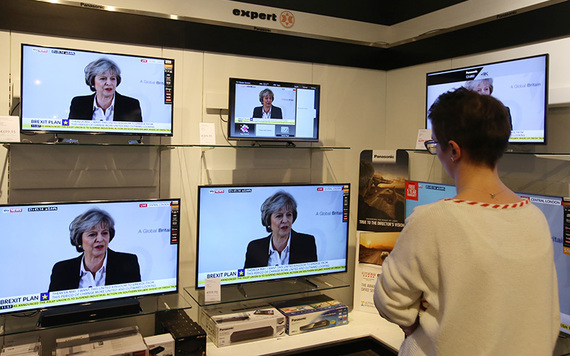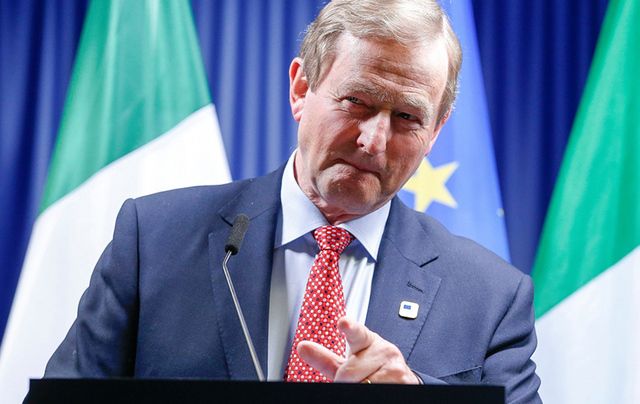Ireland is living on borrowed time, with twin threats ahead that could devastate our economy. Yet if you picked up an Irish newspaper last week all the country seemed to be worried about was nuns getting control of the new national maternity hospital to be built in Dublin.
And of course that possibility is a disgrace, since we are now in the 21st century. Even if you ignore the abusive history of nuns running mother and baby homes and other institutions here in the recent past, there is the inconvenient fact that nuns don't have sex, never mind babies. So why would anyone -- let alone the government which wants to gift them the new hospital -- imagine they would be suitable people to have any level of control in the running of a modern maternity service?

Ireland's Health Minister Simon Harris (center) displaying the proposed Sisters of Charity maternity hospital.
Apart from being sad, hilarious and very "Irish,” it proves that although we like to think we're no longer the priest-ridden country of the past, church and state here are still intertwined in important ways that have yet to be unraveled.
But tempting though this subject is for a columnist, we have to leave it for another day. Other events in the past week, although less entertaining, are far more important for the country.
There were two developments last week which signaled just how vulnerable Ireland will be in the immediate future. Try as the government is doing to pretend there is nothing to worry about and that everything will be "grand,” the reality is that we could be living on borrowed time.
First up last week was President Trump's promised move on tax. The secretary of the Treasury confirmed that the U.S. corporation tax rate is to be cut from 35 to 15 percent (almost bringing it down to the Irish rate of 12.5 percent, a key driver of U.S. investment here).

President Donald Trump.
And making things even worse for us, the administration also confirmed there will be a once-off low repatriation tax to incentivize U.S. companies who hold over a trillion dollars in accumulated profits overseas to bring their money home. The rate was not specified but it is likely to be at or below the 10 percent level already mentioned by Trump.
Both of these moves will have disastrous consequences for Ireland. It's not that the big U.S. employers here will suddenly pull out; they are well entrenched in Ireland and will still need an EU base.
But over time a low corporate tax rate at home will diminish new U.S. investment coming here, not just in the tech giants like Google but in other sectors like the pharma and medtech companies which employ thousands of workers here.
Just some of the US companies based out of Dublin (Via Silicon Dock Maps).
A corporate tax rate of 15 percent in the U.S. will hit us hard in the future, and you would want to be very naive to think otherwise. And if billions in overseas profits are brought home to the U.S. under a low repatriation tax, there will be less funds lying around for reinvestment here anyway.
But it's not just the jobs we might lose -- 336,000 people work for foreign companies (mostly American) in Ireland -- it's also the tax revenue. The Revenue Commissioner’s report for 2016 revealed that more than 80 percent of all the corporation tax paid in Ireland last year came from foreign-owned multinationals here. More than half of that was paid by the top ten foreign firms here, most of which are American.
As well as 80 percent of corporation tax, foreign companies here also generate 50 percent of Pay-As-You-Earn income tax and VAT (sales tax). All of which makes us highly vulnerable to the Trump tax plans. A worst case scenario could see state revenues here fall sharply with consequent cutbacks in state spending like happened here after the crash.
The other part of the twin threat we face is the fallout from Brexit. That also became clearer last weekend when the EU leaders (including Taoiseach Enda Kenny but minus the U.K. Prime Minister Theresa May) met in Brussels to agree their principles for the upcoming Brexit negotiations with Britain.

What's next for Ireland with a looming Brexit?
In the 10-page document produced at the summit, the 27 nations agreed that the EU must "maintain its unity and act as one" in negotiations. It said, "There will be no separate negotiations between individual member states and the United Kingdom."
That was always going to be the EU position. But to see it stated so clearly as a fundamental EU principle for the negotiations will send shivers down Irish spines.
Despite the fact that Ireland is uniquely dependent on trade and other ties with the U.K. -- many times more so than the other EU countries -- we will have no more say in what is agreed in the Brexit deal than anyone else. And that has to be deeply worrying for us.
Not that you would think so from the farcical spin put on it by the taoiseach after the summit, who claimed it as a significant "win" for Ireland. This was based on the statement in the document that Irish concerns, particularly in relation to the border, will be part of the first phase of the negotiations which will deal mainly with the bill Britain will have to pay on leaving and with rights for EU citizens living in the U.K. and British citizens living in Europe.
The EU is saying that satisfactory progress must be made on this first phase before the second phase of negotiations on the EU's future relationship with the U.K. -- and a trade deal -- can begin.
Kenny says that this prominence given to Ireland in the upcoming negotiations is a big success for him and the Irish officials. But words are cheap. When the negotiations begin they are likely to get very frosty very quickly, as seen by the response to the document at the weekend by May.
She was dismissive of the two-phase approach and wants Britain's bill for leaving and a future trade deal to be negotiated together. So even before they begin, the talks are in difficulty, with May repeating her threat that for the U.K. no deal is better than a bad deal. With that wide chasm between the two sides, does anyone seriously think the "prominence" given to Ireland's concerns will amount to much?
Equally ridiculous was Kenny’s self-congratulatory claim that the document was some kind of important achievement in relation to a united Ireland. Prompted by the Irish, the EU leaders agreed that if Northern Ireland votes in a future referendum to join a united Ireland, it would automatically become part of the EU.
But this is not a breakthrough. It simply mirrors what is in the Belfast Agreement and what has already happened after German reunification.
Of course the EU would be happy to see Northern Ireland being a member of the EU as part of a United Ireland. Why wouldn't they? And it's not like it's going to happen any time soon.
Far more important is the catastrophic effect a hard Brexit, with Britain crashing out of the EU without an agreed trade deal, would have on the Irish economy. We are far more dependent on trade with the U.K. than any other country in the EU, with over €1 billion in trade each week with Britain.
In a hard Brexit, with tariffs and barriers on trade between the EU (including us) and Britain, and with the U.K. free to trade with the rest of the world as it wishes, Ireland would be very heavily impacted. Around 80 percent of our exports goes either to or through the U.K. No one is sure what would happen to this, but it's likely to be a disaster for us.
Whether we have arrangements in place for a united Ireland to be part of the EU at some distant point in the future is not going to matter that much if our economy is wrecked in the meantime by Brexit. We can't afford to fund Northern Ireland now, so what hope would we have of doing it then?
Instead of facing up to the twin threats of the Trump tax plan and a hard Brexit, our lame duck taoiseach and his motley crew of a cabinet are whistling past the graveyard.
But hoping for the best is not a policy. Instead of sitting on our hands and forever trying to be the most obedient child in the EU class, we should be negotiating our own arrangements with the U.K. It doesn't matter whether that has been ruled out by the EU document.
We are in a uniquely vulnerable position and we have to protect ourselves. We should have learned that much from the way the EU loaded us with debt after the crash so that German banks could get their money back.
We should negotiate our own deal with the U.K. and then present that to the EU and tell them to include it in the final Brexit deal, if there is one. And if they say no, we should be prepared to walk away.
Read more: Irish gov. ministers mouthing right-wing Trump populism miss the point




Comments